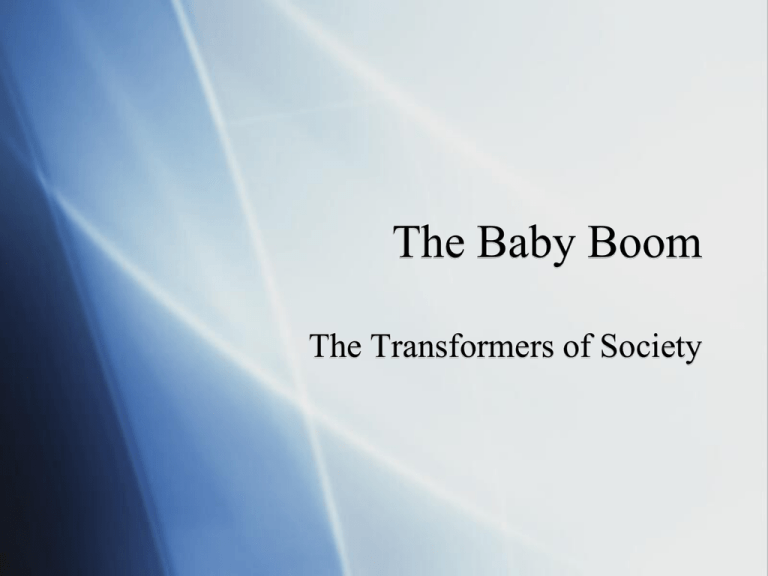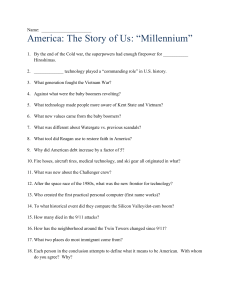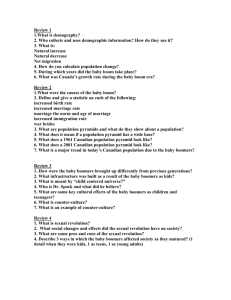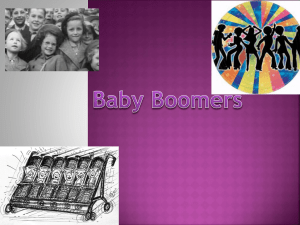
The Baby Boom
The Transformers of Society
Before The Baby Boomers
The two generations before the baby boomers are
important to talk about to understand how we got
to where we are.
Those two generations are :
1. The GI Generation (The greatest Generation)
2. The Silent Generation
The GI Generation
This generation was born from 1900-1925.
They grew up with the growth of America,
hard work and the hope of the American Dream.
This group also had to suffer through the
greatest economic downturn in world history –
The Great Depression
Broadcast journalist Tom Brokaw called them “the
greatest generation that society has ever produced”
He argued that these men and women fought not for
fame and recognition, but because it was the right
thing to do. When they came back they rebuilt
America into a superpower."
The Silent Generation is a label for the generation of
Americans born from 1925-1942, notably during the Great
Depression and World War II.
They grew up under the shadow of the two cataclysmic events.
They were not forgotten but ignored and some
how had to make their mark.
They did by having children!
Lots of them!
Bringing up the Boomers!
After WWII there was great prosperity in
North America, and especially Canada
This not only changed the way babies were
delivered & nurtured, but also the way the
family functioned
Suburban Culture
The rapid growth of the baby boom era contributed
to a new suburban culture in Canada & the US
Demand for housing triggered a tremendous
construction boom beyond the existing built-up
urban areas - Giving the area the name the
“suburbia”
Entire neighbourhoods were constructed quickly
using a few basic floor plans for 5-6 rooms singlefamily bungalows & storey-and-a-half” houses.
For some – owning a suburban home
completed the security triangle – marriage,
baby, house.
Each suburban house was built with a driveway
– making cars a necessity for most families
Suburban Car-Culture
Fast-food restaurants, shopping plazas, and
the now-obsolete drive-in movie theatres
Social Culture
Since the suburbs contained so many young
families, certain social patterns usually developed
within them
After their work was done, women often met at
one another’s house for coffee while their kids
were at school and their husbands were at work.
Some evenings there were adult card parties or
bowling, and on the weekends – sports for kids,
cubs and brownies were also very popular
Each weekend, 60% of
all Canadian cultures
attended religious
services and engaged in
family visits or social
activities
Child-Centered Universe
2 age groups dominated the post-war
suburbs: children under 15 & young adults
between 25-44
There weren’t any teenagers yet, and
grandparents liven somewhere else;
generally, only the nuclear family of 2
parents and young children lived together.
Boomers’ upbringing compared
to previous generations
About 4 out of 5
front end boomers
were delivered in
the hospital,
compared to only
one out of 5 of their
parents. For late
boomers, the ratio of
hospital-born babies
increased to 9 out of
10. This lowered
Canada infant
mortality rate.
Baby formula & small prepared bottles of
baby food often replaced the breast-feeding
and mashed “adult food” of the previous
generation. These commercial foods for
babies and toddlers were advertised as the
modern way to bring up happy, healthy
babies
Family Allowance benefits introduced
across Canada in 1944 by the federal
government provided families with a
monthly “baby Bonus” to help feed and
clothe each child. This allowance helped to
nurture the healthiest generation of children
Canada had known.
Some parents consulted
books written by child-care
specialists, such as
American pediatrician, Dr.
Benjamin Spock, for advice
on raising their children,
instead of relying on the
advice of relatives and
friends as their own parents
had done.
Parents often raised their
children more permissively
than their parents.
Popular TV programs, such as Leave it to
Beaver presented a stereotypical view of the
happy, suburban, father-led family of the
1950’s. While programs did reflect did
reflect some middle-class families it wasn’t
the majority.
Boomers go to School
The sudden increase in population meant increase
pressure on public institutions.
Ex - New hospitals, delivery rooms, & nursery wards
The first wave resulted in a boom in the building of
elementary schools, followed by secondary schools
and finally universities.
Today, Canadians are left with a sizeable national
debt, because of the cost of borrowing to educate
the baby boom generations
Learning was also very different
Previously: teacher-controlled authoritarian
education - expected to master a standard program
that was strongly enforced on the 3-R’s (reading
writing & arithmetic). Students seen as empty
vessels to be filled, all the while following a fairly
strict code of behaviour
1950’s: Progressive Education - developed
by philosopher & educator John Dewey.
More child-centered and teacher training
emphasized that students were naturally
eager to learn.
The 1960’s Counterculture
Mid to late 60’s, the front wave of boomers
hit late teenage years, and became very
visible and vocal.
Many adults considered them to be rude &
loud
1/2 of the population were not yet legally adults
They were strongly influenced by television and
music
They were fully aware of events in the US
My Generation - The Who
People try to put us down
Why don’t you all fade away
Just because we get around
And don’t try and dig what we all say
Things they do look awful cold I’m not trying to cause a big
sensation
Hope I die before I get old
Talkin’ about my generation
This is my generation
This is my generation
This is my generation, baby
This is my generation, Baby
Woodstock
1969, 5 millions gathered in Upstate New
York to be part of Woodstock
Music focused on protest & rebellion against
authority, and the Vietnam war in particular.
Even though promiscuity & drug used
increased, it was still only the minority
They were adventurous, but still
conventional
More were positively involved in political
activism, rights of women and rights of
Aboriginal People
Vietnam War
• 1965 – 1975
•Lengthiest
Military conflict in
American History
• Main intention
was to keep
Communists in
North Vietnam
from expanding
into South Vietnam
Why Unrest?
WW II
VIETNAM
Clear – cut bad guy
Military is great and
powerful
Ideology = Bad
Military plan vague
No way to win
Quickly
The Draft
Due to the nature of
the Vietnam war, men
are reluctant to join
the war effort,
resulting in a draft.
Most of those drafted
came from lower
socio-economic
classes
PROTEST
As a result of the
draft, large rallies
are held to protest
the war – led by
students on
college campuses
WHY?????
In addition to
the draft, the
Vietnam war
was the first war
that could be
followed on the
television
Rolling Stones --
I see a red door and I want it painted black
No colors anymore I want them to turn black
I see the girls walk by dressed in their summer clothes
I have to turn my head until my darkness goes
I see a line of cars and theyre all painted black
With flowers and my love both never to come back
I see people turn their heads and quickly look away
Like a new born baby it just happens evry day
I look inside myself and see my heart is black
I see my red door and it has been painted black
Maybe then Ill fade away and not have to face the facts
Its not easy facin up when your whole world is black
No more will my green sea go turn a deeper blue
I could not foresee this thing happening to you
If I look hard enough into the settin sun
My love will laugh with me before the mornin comes
I see a red door and I want it painted black
No colors anymore I want them to turn black
I see the girls walk by dressed in their summer clothes
I have to turn my head until my darkness goes
Hmm, hmm, hmm,...
I wanna see it painted, painted black
Black as night, black as coal
I wanna see the sun blotted out from the sky
I wanna see it painted, painted, painted, painted black
Yeah!
Chemical Warfare
Napalm and Agent Orange
Sexual Revolution
1960’s brought with it the sexual revolution, a time
during which behaviour and morals in NA began to
change drastically.
There was a sharp incline of children born unmarried
mothers (known as “illegitimate births”)
This could be interpreted in 2 different ways 1) either more couples were living together instead of
becoming legally married or
2) more people were engaging in premarital sex
Stats indicate a steady rise in Canadian marriage rates
from the mid 1960’s onwards, representing the
weddings of the front-end boomers
BUT a comparison to the stats indicates that births
outside of marriage were increasing at a faster rate.
Canadians were influenced by the growing
emphasis on personal and sexual freedom
that was an important part of the baby boom
era
Technology played an important part in the
sexual revolution through the development
of the birth control pill.
It was made widely available at a relatively
low price, through doctor’s prescriptions.
The Pill
1961, invention of “The Pill”
Birth-control was the most popular means
to delay child-bearing
Overall, the birth rate sagged 1965-75
Female boomers were the best-educated
women up to that point in history because
they chose to continue their careers after
marriage
THE BABY BOOM WAS OVER!








